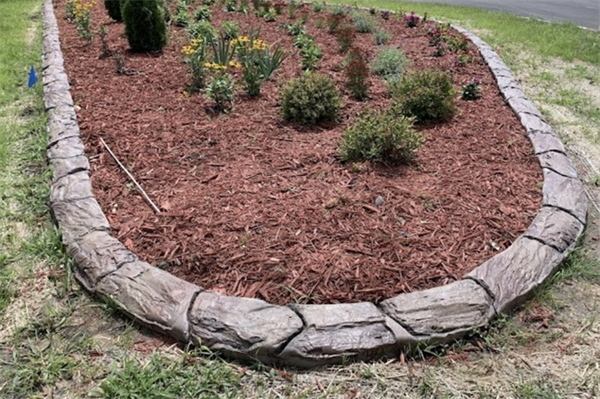How Does Seasonal Mulch Installation Contribute to Plant Health and Soil Quality?

Mulching is key in supporting healthy gardens and landscapes, especially in Minnesota, where shifting seasons affect soil and plants. When used correctly, mulch improves soil quality, retains moisture, controls weed growth, and protects plants from harsh weather. The long-term gains include better soil fertility and more sustainable landscape management.
Knowing which mulch works best and how it holds moisture, blocks weeds, and benefits your yard is essential. Our experts break down these factors to guide you in choosing the right mulch for your lawn throughout the year.
What Types of Mulch are Most Beneficial for Minnesota Gardens?
In Minnesota, where seasonal fluctuations range from freezing winters to humid summers, choosing the right mulch is essential for plant health. Organic mulches such as shredded hardwood, bark, straw, and compost offer the best benefits by improving soil quality over time. These materials decompose naturally, enriching the soil with nutrients essential for plant growth.
Wood-based mulches like cedar and cypress are particularly effective in Minnesota gardens, as they provide insulation during cold months and regulate soil temperature during summer. Mulches made from straw or pine needles work well in vegetable gardens, enhancing aeration and preventing soil compaction. Meanwhile, compost mulch improves soil fertility by adding essential organic matter while also retaining moisture.
Inorganic mulches such as rock or rubber are also options but do not break down to enhance soil quality. They are more suited for decorative landscaping or areas with high foot traffic. For most gardeners in Minnesota, organic mulch remains the best choice due to its ability to regulate temperature and improve soil structure naturally.
How Does Mulch Help in Moisture Retention for Plants?
Mulch is vital for maintaining soil moisture, which is crucial for plant health, particularly during dry periods. By acting as a barrier between the soil and the atmosphere, mulch reduces water evaporation and keeps the root zone hydrated for longer. This is especially beneficial for plants in Minnesota, where summer heat and dry spells can stress vegetation.
Organic mulches such as wood chips, straw, and shredded leaves absorb and retain moisture, creating a buffer that allows plants to access water gradually. This reduces the need for frequent irrigation, making it an effective water conservation strategy. Furthermore, mulch prevents soil crusting, allowing rainwater and irrigation to penetrate more efficiently.
By maintaining consistent soil moisture levels, mulch helps plants thrive and improves microbial activity in the soil. Beneficial microorganisms break down organic matter, releasing essential nutrients that promote plant growth. A well-mulched garden is more resilient to drought and temperature fluctuations, ensuring healthier plants throughout the growing season. To enhance these benefits, consider using mulch as part of a comprehensive soil management strategy.
What is the Impact of Mulch on Weed Suppression?
Mulch is one of the most effective natural weed control methods available to gardeners. Covering the soil surface blocks sunlight, preventing weed seeds from germinating. Many common weeds struggle to establish themselves without sufficient light, reducing the need for manual weeding or chemical herbicides.
The effectiveness of mulch in weed suppression depends on its thickness and material. A 2-4 inch layer of organic mulch, such as wood chips or shredded bark, provides the best coverage, creating a dense barrier against unwanted plant growth. Straw mulch is beneficial in vegetable gardens, preventing weeds and breaking down to enrich the soil.
Beyond reducing weeds, mulch improves the overall health of garden beds by minimizing soil disturbance. When the soil is undisturbed, beneficial organisms such as earthworms and fungi thrive, contributing to a healthier soil ecosystem. This natural weed control method not only enhances the aesthetics of a garden but also reduces the labor-intensive task of weeding.
How Often Should Mulch be Replenished in Garden Beds?
Mulch should be replenished regularly to maintain its benefits and ensure long-term soil health. The replenishment frequency depends on the type of mulch used, environmental conditions, and the decomposition rate. Organic mulches, such as wood chips and bark, typically last 1-2 years before breaking down and requiring replacement.
In Minnesota, where winter conditions can cause mulch to shift or compact, refreshing mulch in the spring is ideal. This helps restore the protective layer before summer heat sets in. Additionally, if mulch becomes too compacted or develops mold, it should be loosened or replaced to maintain proper air circulation and prevent fungal growth.
For optimal plant health, checking mulch depth each season is recommended. If the layer has thinned to less than 2 inches, adding a fresh layer will help maintain moisture retention, weed suppression, and soil insulation. Consistent mulch maintenance ensures that garden beds remain productive and visually appealing throughout the year.
What are the Environmental Benefits of Using Organic Mulch?
Organic mulch offers numerous environmental benefits, making it an excellent choice for sustainable gardening. One of its primary advantages is soil enrichment—decomposing organic mulch enhances soil fertility by adding essential nutrients, reducing the need for synthetic fertilizers.
Additionally, organic mulch plays a role in carbon sequestration by helping soil retain organic matter and reducing carbon dioxide release. Mulch contributes to overall soil health by improving soil structure and microbial activity, which is crucial for plant resilience and biodiversity.
Another significant environmental advantage is erosion control. Mulch prevents soil erosion by shielding the ground from heavy rain, reducing runoff, and maintaining soil stability. This is particularly important in sloped gardens or areas prone to water drainage issues. Choosing organic mulch is a practical and eco-friendly way to support sustainable gardening practices and enhance landscape resilience.
Using organic mulch is a simple yet effective strategy for improving your garden while supporting the environment.
Keep Your Yard in Great Condition with the A-1 Curb Appeal Pros
From mulch to landscaping and tree care, A-1 Curb Appeal does it all! Our team is efficient and fast, and we always put our customers first.
If it's time to improve your yard, we are here to help. Contact us online for your free estimate to get started.